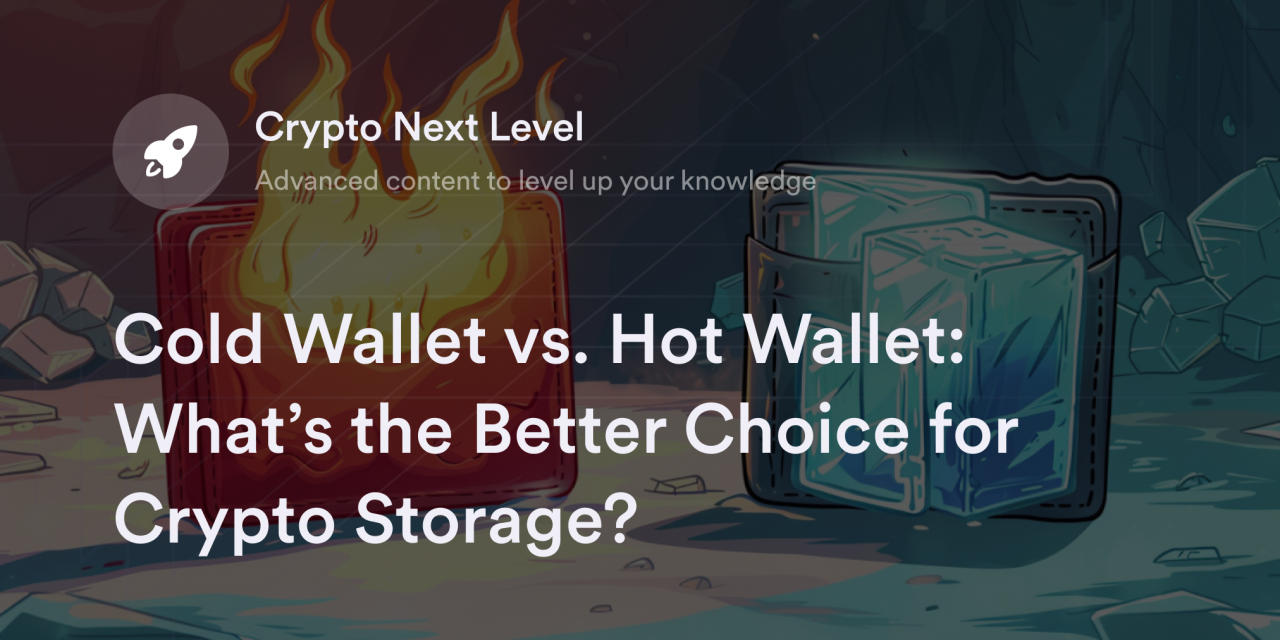


Crypto wallets are indispensable tools in the digital assets ecosystem. With a wallet address, anyone can send, spend, and store cryptocurrencies. For crypto investors, specifically, wallets provide exceptional security and control over their virtual funds. Plus, they serve as the gateway to dynamic decentralized applications (dApps) such as dYdX.
Although every crypto wallet has similar features, they are divided into two main categories—cold wallets and hot wallets. Learn how they differ to make informed decisions about where to store your cryptocurrencies.
How do crypto wallets work?
First things first––crypto wallets don’t actually hold cryptocurrencies. Digital coins, such as Bitcoin (BTC) and Ethereum (ETH), always live on their respective blockchains—decentralized networks of computers that process crypto transactions. Accessing crypto requires a dual-key system to ensure a secure transfer, so wallets store a unique blockchain address with two types of keys:
Private keys are long lists of encrypted alphanumeric characters that give users sole access to their accounts and the crypto funds in their wallet. They also encrypt and decrypt information.
Public keys are also uniquely encrypted strings of letters and characters. When paired with a private key, a public key allows users to receive transactions.
The main distinction between cold wallets and hot wallets is how they store private keys. Think of public keys as your house address and private keys as the physical key to your property. You can safely share your address to receive packages or welcome friends, but you wouldn’t give your home key to someone you don’t trust. The same holds true with public and private wallet keys––feel free to share your public keys to receive crypto from friends, family, or other third parties, but keep your private keys secure.
So what are the differences between cold and hot wallets?
“Cold” and “hot” refer to the location of a wallet’s private keys. While cold wallets store these keys offline, hot wallet keys are always connected to the internet. This difference has significant implications for each crypto wallet’s security and functionality.
What’s a cold wallet?
Cold wallets safeguard private keys in an offline device, such as a USB drive. Since remote hackers cannot break into hardware devices, cold wallets are an attractive option for safety-conscious crypto investors.
However, cold wallets are neither free nor user-friendly—especially for active traders. Since users need a physical device to confirm transfers, it’s inconvenient to use these wallets while traveling. Relying on cold wallets can slow a trader down, which can be costly in the fast-moving crypto market. If you decide a cold wallet works best, here are some examples:
Paper wallets: During crypto’s early days, some investors printed their public keys. While people still use paper wallets, they’ve become less common due to the availability of secure hardware units.
Hardware wallets: These are USB devices that link to PCs and store crypto assets. Some leading hardware wallet manufacturers include Ledger, Trezor, and ShapeShift.
What’s a hot wallet?
Hot crypto wallets are online software applications that store virtual currencies on desktops or mobile devices. Most link with dApps on popular blockchains, such as Ethereum, Solana, and Polygon.
Even better, these wallets are free to download, making them accessible for crypto beginners and those looking to save money. They are also more convenient for active crypto traders than cold wallets. The user interface and user experience (UI/UX) are simple to navigate, and users don’t have to carry a physical device to access their keys. Plus, most Web3 applications sync with hot wallets, making them easier to use in emerging fields such as DeFi (decentralized finance) or NFT (non-fungible token) trading.
However, hot wallets are susceptible to hacks. Because the private keys are online, hackers could exploit a vulnerability and steal critical information. For this reason, even the best-reviewed hot wallet can’t provide the same level of protection as a high-quality hardware device. If you decide a hot wallet best suits your needs, here are some examples:
Mobile wallets: Mobile hot wallets are smartphone- or tablet-compatible apps. Examples include Trust Wallet, Rainbow Wallet, and Coinbase Wallet.
Desktop wallets: For those who prefer using a PC, these hot wallets work on desktops—and some even double as browser extensions. Popular examples are MetaMask, Phantom, and Exodus.
Are there other crypto wallet options?
Although all crypto wallets are either hot or cold, each has a few variations. Choosing the best solution for your needs depends on how much control you want over your crypto. Here are some options:
Self-custodial wallets: These provide users with private keys so there are no centralized intermediaries between traders and their crypto. They also link to countless DeFi services, NFT markets, and games in Web3.
Custodial wallets: Custodial wallets are available on centralized crypto exchanges (CEXs), such as Coinbase. Only the CEX knows the private keys for the crypto on its platform, so custodial wallet holders must rely on a third party to safeguard their crypto. For example, if you buy Bitcoin on a CEX, the CEX watches over the BTC in your account until you transfer it to a self-custodial wallet.
Multi-sig wallets: Multiple-signature wallets require more than one owner (co-owner) to confirm every crypto transaction with a unique private key. Since these wallets need “multiple signatures” to work, they’re more difficult for hackers to exploit. Even if cybercriminals hack one of the private keys, the crypto is still secure.
Safety tips for using crypto wallets
When you transfer crypto to a self-custodial wallet, you’re responsible for any mishaps. It pays to practice basic wallet safety to prevent accidentally losing crypto. Consider these steps:
Store your “seed phrase” in a private place: A seed phrase is a list of words representing a wallet’s private keys. They serve as a backup if you break your phone or cold storage device. Write these words down, and keep them in a secure place, such as a safety deposit box. Anyone with access to your seed phrase can take your crypto, so never share these words with other people.
Install two-factor authentication (2FA): Many modern crypto wallets have a 2FA feature that links with authenticator apps, such as Google Authenticator. After enabling 2FA, users must enter a random series of numbers from the authenticator when they open their wallet or send crypto. It’s more difficult for hackers to break into 2FA wallets because the codes in authenticator apps change every few seconds.
Buy hardware devices from the manufacturer’s site: Don’t be tempted by the lower prices of hardware wallets on third-party websites, such as eBay. Purchase cold wallets directly from the manufacturer to avoid unintentionally downloading malware.
Crypto wallet FAQs
Storing crypto safely and securely is of the utmost importance, so making informed decisions is crucial. Still have questions about the efficacy of different crypto storage solutions? Here are the answers to some common queries.
1. Are cold wallets better than hot wallets?
There’s no definitive answer to this question—the best wallet depends on the user. Cold wallets are the superior option in terms of security, but hot wallets tend to be more affordable and easier to use. Investors can choose between the two types of wallets based on their personal preferences. If you plan to transfer crypto frequently, you may prefer the convenience of a hot wallet. However, if you want to hold on to crypto for a long time, the security of cold storage devices may be best.
For a blend of flexibility and security, some people use both hot wallets and cold wallets. This way, traders only need to put the crypto they’re actively using in a hot wallet, while their long-term crypto holdings are safely held in cold storage.
2. Is a cold wallet worth it?
Cold wallets have greater security than hot wallets, making them ideal for crypto investors who want to hold on to assets for the long haul. Consider a cold storage unit if you have or want a significant position in cryptocurrency.
3. Are custodial wallets safe?
The primary risk associated with custodial wallets is that users don’t control their private keys. If a CEX wanted to freeze customer withdrawals at any time, it could. For instance, crypto exchange FTX ceased customer withdrawals in 2022 before filing for bankruptcy. While reputable CEXs often use high-grade cold storage to secure crypto, there’s always an element of trust involved in relying on custodial wallets. By using a custodial wallet, you will always be taking on counterparty risk.
4. Where do you download hot wallets?
There are dozens of highly rated hot wallets on Google Play and Apple’s App Store. If you can’t find what you’re looking for on either of these platforms, visit the wallet’s official website for download instructions.
Build your crypto knowledge with dYdX
Check out our blog to learn more about dYdX and our product. You can also head to our academy to learn more about crypto and trading strategies. Head to our main page to start trading on dYdX today!
Disclaimer
The content of this article (the “Article”) is provided for general informational purposes only. Reference to any specific strategy, technique, product, service, or entity does not constitute an endorsement or recommendation by dYdX Trading Inc., or any affiliate, agent, or representative thereof (“dYdX”). Use of strategies, techniques, products or services referenced in this Article may involve material risks, including the risk of financial losses arising from the volatility, operational loss, or nonconsensual liquidation of digital assets. The content of this Article does not constitute, and should not be considered, construed, or relied upon as, financial advice, legal advice, tax advice, investment advice, or advice of any other nature; and the content of this Article is not an offer, solicitation or call to action to make any investment, or purchase any crypto asset, of any kind. dYdX makes no representation, assurance or guarantee as to the accuracy, completeness, timeliness, suitability, or validity of any information in this Article or any third-party website that may be linked to it. You are solely responsible for conducting independent research, performing due diligence, and/or seeking advice from a professional advisor prior to taking any financial, tax, legal, or investment action.
You may only use the dYdX Services in compliance with the dYdX Terms of Use available here, including the geographic restrictions therein.
Any applicable sponsorship in connection with this Article will be disclosed, and any reference to a sponsor in this Article is for disclosure purposes, or informational in nature, and in any event is not a call to action to make an investment, acquire a service or product, or purchase crypto assets. This Article does not offer the purchase or sale of any financial instruments or related services.
By accessing this Article and taking any action in connection with the information contained in this Article, you agree that dYdX is not responsible, directly or indirectly, for any errors, omissions, or delays related to this Article, or any damage, injury, or loss incurred in connection with use of or reliance on the content of this Article, including any specific strategy, technique, product, service, or entity that may be referenced in the Article.







